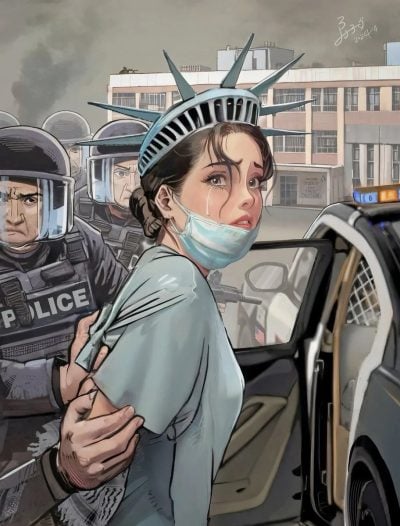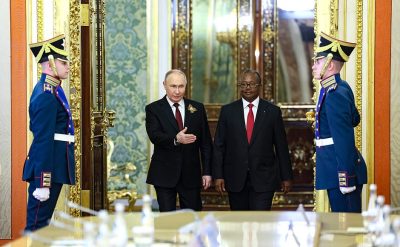U.S. Gave Military Jeeps to Guatemala to Fight Drug Trafficking. Instead, They Were Used to Intimidate an Anti-Corruption Commission.

THE ARMORED JEEPS were lined up single file along a Guatemala City street on August 31 in an ominous queue. By mid-morning, images began circulating of the jeeps outside the offices of a U.N.-backed anti-corruption commission that has played a key role in bringing down corrupt officials. More jeeps were spotted in the vicinity of the National Palace, along with military personnel. In a country with a not-so-distant past of military coups and massacres, the photographs and videos spread like wildfire, raising alarm as people scrambled to find out what was going on.
To Feliciana Macario, the show of force evoked the worst years of military rule in Guatemala, during the 36-year armed conflict between the U.S.-backed military and paramilitary forces and left-wing guerrilla groups. Macario is one of the national coordinators of CONAVIGUA, a national human rights organization founded by women whose husbands were killed or disappeared during the conflict.
“It creates the threat of a return to the 1980s,” said Macario, an Indigenous Maya Kiche woman who works with victims and survivors of conflict-era state violence.
The armed conflict left more than 200,000 people dead and another 45,000 disappeared. More than 80 percent of victims were Indigenous Maya civilians, and the military was the perpetrator in the overwhelming majority of cases. A U.N.-backed truth commission and now two Guatemalan courts have determined that the military committed genocide in the early 1980s. Peace Accords ended the armed conflict in 1996, but Macario said that Guatemala’s current president, Jimmy Morales, is violating the terms.
“One of the Peace Accords that we highlight is the accord on the role of the army within society. It says that the army has to reduce its numbers, its budget, and everything. But on the contrary, what Jimmy Morales is doing is militarizing. He is increasing the army’s budget and wants to remilitarize the country,” Macario told The Intercept.
Roughly two hours after the jeeps were first spotted outside the offices of the International Commission Against Impunity in Guatemala — CICIG, by its Spanish acronym — Morales stood inside the National Palace flanked by military and police officials and announced that he would not renew CICIG’s mandate, sparking legal challenges, protests, and an ongoing political crisis. The deployment of the jeeps deepened concerns among many Guatemalans about Morales — all the more so when the U.S. Embassy in Guatemala revealed that the vehicles had been donated by the United States for use in border regions, not the capital. Morales and his backers have been courting the support of the Trump administration and Republican lawmakers against CICIG, and there are signs that the U.S. government’s longstanding support for the commission is weakening.
“They were donated by the United States to combat drug trafficking on the borders and they were used to intimidate CICIG, violating everything the agreement says.”
Two months after the jeeps lined the street outside the CICIG offices, the official justification for their use on August 31 is as murky as ever. It was a routine patrol to combat criminal activity, said the Minister of the Interior. It was to protect public institutions and buildings, according to police documents. It was to deter possible violent protests, said the president. Nearly every time a government official makes a statement or a new document comes to light regarding the Jeep J8s, the story becomes a little bit — or a lot — different.
Regardless of the shifting rationales, one thing is now clear: The Guatemalan government violated an agreement with the United States regarding the latter’s donation of Jeep J8s. Both the U.S. Department of State and the Department of Defense confirmed to The Intercept that the vehicles were donated for use by specific Guatemalan interagency task forces for counternarcotics operations in border regions. Their transfer or use outside of those parameters would constitute a violation of the donation agreement, both departments indicated to The Intercept. However, Guatemalan police documents obtained by The Intercept show a pattern of such J8 transfers and use in the months leading up to and including the August 31 deployment in Guatemala City.
“They were donated by the United States to combat drug trafficking on the borders and they were used [August 31] to intimidate CICIG, violating everything the agreement says,” said Guatemalan Human Rights Ombudsman Jordán Rodas, who has challenged the August 31 deployment in Guatemala’s Constitutional Court.


